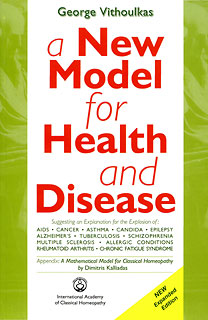Vithoulkas' book has created some controversies with his assertion that all modern illnesses are the result of excessive drug use; HIV virus, for example, would be the result of excessive use of antibiotics. This assertion, however, serves as a platform from which Vithoulkas advocates for a change of paradigm in medical science and for the recognition that alternative solutions already exist and should be made more widely available.
'Virus transformations as a consequence of pharmacological pollution in the human body/mind ecological system is a compelling hypothesis based on the data presented in George Vithoulkas' A New Model for Health and Disease. It strongly underscores the need to focus on an 'energy' medicine to correct the deficiencies of our present 'chemical' medicine.'—William A. Tiller, Ph.D., Materials Science and Engineering, Stanford University
In this long-awaited ground-breaking treatise, theorist and homeopathic teacher George Vithoulkas presents a new paradigm for modern medicine. Established medicine has failed in its mission to prevent or cure many diseases, Vithoulkas asserts, because of the excessive and often needless use of powerful drugs. Western medicine has a limited view of the total organism and the true sources of disease.
Vithoulkas relates the increasing incidence of ATDS, cancer, asthma, epilepsy, schizophrenia, Alzheimer's disease, rheumatoid arthritis, and other difficult-to-control illnesses to the weakening of the immune system from over-prescribing of drugs. Only when we fully integrate the role of the psyche, spirit and emotions into our explanations of illness, he says, will we be able to generate a fuller definition of health, and change our conception and methods of treatment.
from A New Model for Health and Disease ...
'The quality of our health depends almost entirely on the quality of micro organisms that exist normally within our body and thus form the basis of our life. If we disturb their equilibrium by pumping all this 'mold' into the organism, we are going to have a 'moldy, organism eventually.'
'The hypothesis in this treatise is that the HIV (Human Immunosuppressive Virus) would not have appeared and affected the human race in such an epidemic manner unless it had been preceded by widespread and frequent use of antibiotics which prepared the ground by breaking down the organism's immune system.'
George Vithoulkas teaches and lives in Greece. His books include Homeopathy: Medicine of the New Man and The Science of Homeopathy.
 Wishlist
Wishlist






